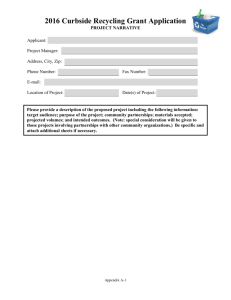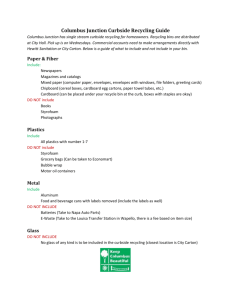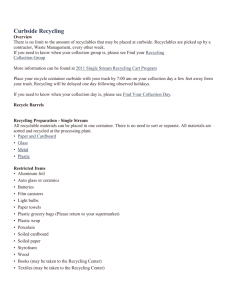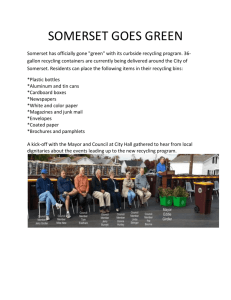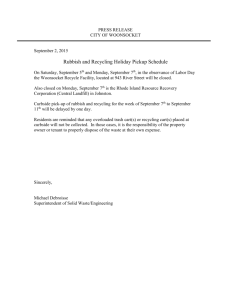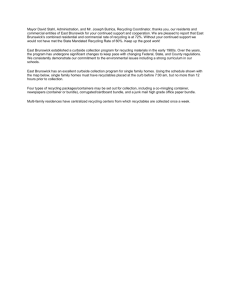Memorandum - City of Lawrence
advertisement
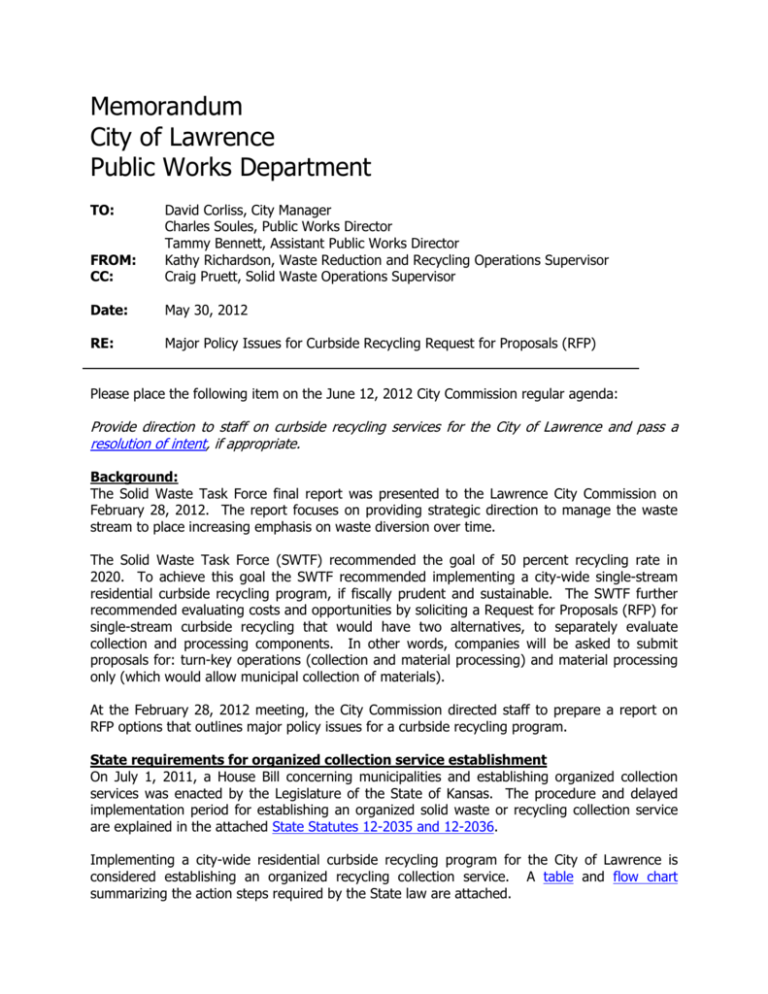
Memorandum City of Lawrence Public Works Department TO: FROM: CC: David Corliss, City Manager Charles Soules, Public Works Director Tammy Bennett, Assistant Public Works Director Kathy Richardson, Waste Reduction and Recycling Operations Supervisor Craig Pruett, Solid Waste Operations Supervisor Date: May 30, 2012 RE: Major Policy Issues for Curbside Recycling Request for Proposals (RFP) Please place the following item on the June 12, 2012 City Commission regular agenda: Provide direction to staff on curbside recycling services for the City of Lawrence and pass a resolution of intent, if appropriate. Background: The Solid Waste Task Force final report was presented to the Lawrence City Commission on February 28, 2012. The report focuses on providing strategic direction to manage the waste stream to place increasing emphasis on waste diversion over time. The Solid Waste Task Force (SWTF) recommended the goal of 50 percent recycling rate in 2020. To achieve this goal the SWTF recommended implementing a city-wide single-stream residential curbside recycling program, if fiscally prudent and sustainable. The SWTF further recommended evaluating costs and opportunities by soliciting a Request for Proposals (RFP) for single-stream curbside recycling that would have two alternatives, to separately evaluate collection and processing components. In other words, companies will be asked to submit proposals for: turn-key operations (collection and material processing) and material processing only (which would allow municipal collection of materials). At the February 28, 2012 meeting, the City Commission directed staff to prepare a report on RFP options that outlines major policy issues for a curbside recycling program. State requirements for organized collection service establishment On July 1, 2011, a House Bill concerning municipalities and establishing organized collection services was enacted by the Legislature of the State of Kansas. The procedure and delayed implementation period for establishing an organized solid waste or recycling collection service are explained in the attached State Statutes 12-2035 and 12-2036. Implementing a city-wide residential curbside recycling program for the City of Lawrence is considered establishing an organized recycling collection service. A table and flow chart summarizing the action steps required by the State law are attached. City goals: The RFP will seek a Proposer(s) who will work collaboratively with the City of Lawrence to: Increase the amount of material being diverted from the landfill. Increase recycling participation rates. Ensure a marketable end product from collected recyclables. Promote the City’s sustainability goals. Enhance community awareness of recycling. Two service solution types included in Request for Proposals: The curbside recycling RFP will include two service solution types: (1) Turn-key recycling operations. Includes collecting recyclables curbside from customers within the designated service area; delivering collected materials to designated processing facility; purchasing, receiving, storing, delivering, and maintaining recycling set-out containers; participating in public education of the recycling program; and providing reports to the City concerning recyclable quantities and participation. (2) Recyclables material processing and marketing only (which would allow municipal collection of recyclables). Includes receiving, sorting, processing, storing, marketing, selling, and transporting of recyclables collected from the City’s recycling program; participating in public education of the recycling program; and providing reports to the City concerning recyclable quantities. This specifically excludes collection services. Proposers may submit multiple, alternate responses to each service solution type. Major policy issues for curbside recycling Request for Proposals: Outlined below are the curbside recycling program major policy issues for the City Commission to consider and evaluate. Decisions on major policy issues will help define the Scope of Work section in the RFP. Participation: subscription based or mandatory pay. Collection details: identification of recyclable materials to be collected; collection method (single-stream, dual-stream, source separated); type of collection containers (roll-out carts, totes, bags); frequency of service (weekly or every other week). Customers: single family households; multi-family households. Public spaces: city buildings; parks; downtown recycling. Collection service provided by: the City, one private hauler, multiple haulers. Processing of materials: material recovery facility, direct haul or transfer station. Pricing schedule and revenue sharing: cost proposal (cost per household per month); revenue sharing from the sale of recyclable materials. Responsibility for administrative services: customer complaints; billing. Performance assurances: during contract term (recordkeeping, auditing, inspection rights); after contract termination (performance bond, letter of credit, parent guarantee). Length of contract: number of years for initial term of contract; number of contract renewal terms allowed, if any. Additional information on these major policy issues is outlined in the attached matrix. Draft Request for Proposals document: The attached draft RFP for curbside recycling collection services outlines the proposal information, minimum specifications, proposal content, evaluation criteria and the equal opportunity agreement. Revisions to the RFP document will be completed as directed by the City Commission. Public education: Education is a fundamental part of a successful recycling program. Education increases participation and yields more materials recycled. The success of any educational campaign is dependent on the campaign being ongoing and consistent. The Solid Waste Task Force recommended development of a comprehensive outreach and education program to facilitate the implementation of solid waste program changes. The City and the Contractor(s), private MRF and/or hauler(s), should engage in the education program. Addressing promotional and educational requirements of the Contractor(s) within the Scope of Services in the RFP is recommended. The Contractor(s) can provide critical insight into education programs by identifying problem routes, providing feedback on common contamination problems, and giving technical input on specific materials to target for recovery. The Contractor(s) can also provide specific items, such as funding, literature, or promotional items, to support public education programs. In addition, the Contractor(s) can make public appearances and participate in public service announcements. Next steps: If the City Commission adopts the resolution of intent, the City will develop a draft plan for establishing an organized recycling collection service within the following 90-day period. Staff will schedule planning meetings and invite haulers currently operating recycling collections services in Lawrence to participate in these meetings. Meeting information will be posted on the City’s website and online calendar. The City will also send notification by electronic mail to anyone who desires such notification. The draft plan for establishing an organized recycling collection service and a RFP document will be submitted to the City Commission after the 90-day period following the adoption of the resolution of intent. With City Commission approval, the City will solicit and evaluate proposals for collection and processing components of a curbside recycling program. Recommended action: Provide direction to staff on curbside recycling services for the City of Lawrence and pass a resolution of intent, if appropriate.
